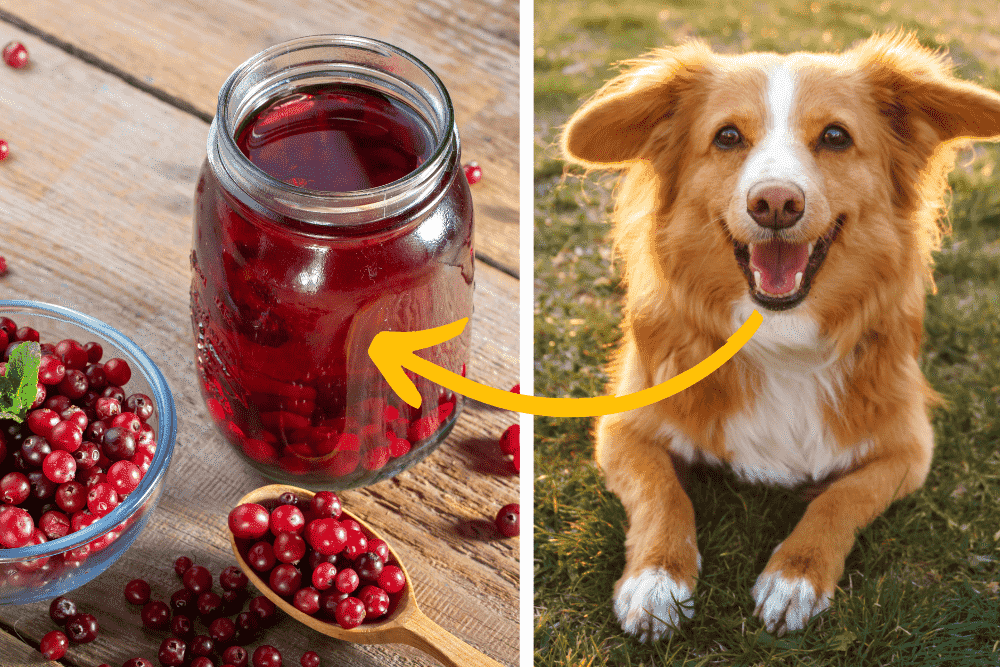Can dogs drink cranberry juice? It’s a question that often comes up for pet owners, especially those who want to ensure their furry friends are healthy and happy. As a dog lover myself, I understand the importance of knowing what foods and drinks are safe for our canine companions. In this article, I’ll address the issue of whether dogs can safely consume cranberry juice, exploring the potential risks and benefits associated with it.
The problem with giving cranberry juice to dogs lies in its acidity and sugar content. While cranberries themselves can be beneficial for dogs due to their antioxidant properties and potential to support urinary tract health, the concentrated form found in juice can pose risks. Excessive consumption of cranberry juice can lead to digestive upset, including diarrhea and stomach discomfort, in dogs. Additionally, the high sugar content in many commercially available cranberry juices is not suitable for dogs and can contribute to obesity and dental problems. It’s crucial to be cautious with any human foods or beverages, including those like rum and cranberry juice, as they may contain ingredients that can be harmful to our furry friends.
Fortunately, there’s a solution for dog owners who want to incorporate cranberries into their pet’s diet without the risks associated with juice. Instead of offering cranberry juice, opt for fresh or frozen cranberries as a safer alternative. These can be added sparingly to your dog’s food or even frozen into homemade treats. By avoiding the concentrated form of cranberry juice and opting for whole cranberries in moderation, you can help support your dog’s health without compromising their well-being.
Can Dogs Have Cranberry Juice?
As a dog lover, I know it’s natural to want to share tasty treats with our furry friends, but when it comes to cranberry juice, it’s best to steer clear. While cranberries themselves can be beneficial for dogs in moderation, the concentrated form found in juice may upset their stomachs due to its acidity and sugar content. It’s safer to stick to fresh or frozen cranberries as occasional treats instead of risking any tummy troubles with cranberry juice.
Can Dogs Eat Cranberries?

Yes, dogs can eat cranberries! These little red berries are packed with antioxidants and can be a healthy treat for your furry friend. However, it’s important to give them in moderation, as too many cranberries can cause digestive upset. You can offer cranberries fresh, frozen, or even dried as a tasty snack for your dog. Just be sure to avoid giving them cranberry sauce or cranberry products with added sugars, as these can be harmful to your pet’s health.
Potential Risks Of Cranberry Juice For Dogs
When it comes to sharing human foods with our canine companions, it’s essential to be aware of potential risks, even with seemingly healthy options like cranberry juice. While cranberries themselves can offer benefits for dogs, the concentrated form found in juice can pose several risks. Here are some of the potential dangers to consider:
Acidity and Digestive Upset
Cranberry juice, being highly acidic, can cause irritation to your dog’s stomach lining, leading to symptoms such as vomiting and diarrhea. Dogs have sensitive digestive systems, and the acidity of cranberry juice may be too harsh for them to handle comfortably. Introducing such acidity can disrupt the natural balance of their gut flora, potentially causing discomfort and digestive issues. Therefore, it’s crucial to be cautious when considering offering cranberry juice to your furry friend.
Sugar Content
Many commercially available cranberry juices are laden with added sugars or sweeteners, which can be harmful to dogs. Excessive sugar consumption can lead to weight gain, diabetes, and dental problems in dogs, just as it does in humans. Dogs’ bodies are not designed to process large amounts of sugar efficiently, making it important to avoid giving them cranberry juice with added sugars. Opting for natural, unsweetened cranberry products or fresh cranberries instead can help prevent these risks.
Potential for Urinary Problems
While cranberries are often praised for their potential to support urinary tract health, the concentrated form of cranberry juice may not provide the same benefits for dogs. In fact, the high acidity of cranberry juice can sometimes exacerbate existing urinary issues or cause discomfort during urination. Additionally, the concentration of cranberry juice may not be as effective in promoting urinary health in dogs as it is in humans. Therefore, it’s wise to consult with a veterinarian before introducing cranberry juice into your dog’s diet, especially if they have any urinary concerns.
Allergic Reactions
Some dogs may develop allergies or intolerances to cranberries over time, leading to allergic reactions when they consume cranberry juice. Signs of an allergic reaction can include itching, swelling, hives, or difficulty breathing. If your dog exhibits any of these symptoms after consuming cranberry juice, it’s essential to seek immediate veterinary attention. Allergic reactions can range from mild to severe and may require medical intervention to ensure your dog’s well-being. Therefore, it’s crucial to monitor your dog closely whenever you introduce new foods or beverages into their diet, including cranberry juice.
The Importance Of Urinary Health In Dogs
Urinary health plays a crucial role in maintaining your dog’s overall well-being and quality of life. A healthy urinary system allows your dog to efficiently remove waste and toxins from their body while maintaining proper hydration levels. Here are some key reasons why urinary health is important for dogs:
Prevention of Urinary Tract Infections (UTIs)
A well-functioning urinary system helps prevent the development of urinary tract infections (UTIs) in dogs. UTIs can cause discomfort, pain, and even serious health complications if left untreated. By promoting urinary health, you can reduce the risk of UTIs and ensure your dog’s comfort and happiness.
Prevention of Urinary Stones and Crystals
Dogs can develop urinary stones and crystals, which can obstruct the flow of urine and lead to urinary tract blockages. These blockages are not only painful but can also be life-threatening if they prevent your dog from urinating normally. Maintaining urinary health through proper hydration and diet can help prevent the formation of stones and crystals, keeping your dog’s urinary system functioning smoothly.
Detection of Underlying Health Issues
Changes in your dog’s urinary habits or the appearance of their urine can sometimes indicate underlying health issues, such as kidney disease, diabetes, or bladder infections. Monitoring your dog’s urinary health allows you to detect these issues early and seek prompt veterinary care. Early intervention can make a significant difference in managing and treating these conditions effectively, improving your dog’s prognosis and quality of life.
Overall Well-being and Comfort
A healthy urinary system contributes to your dog’s overall well-being and comfort. When your dog’s urinary system is functioning properly, they are less likely to experience discomfort, pain, or complications related to urinary issues. This allows them to enjoy their daily activities, maintain their energy levels, and live a happy, active life.
Alternatives To Cranberry Juice For Supporting Canine Health
When it comes to supporting our furry friends’ health, exploring alternatives to cranberry juice for dogs can offer peace of mind. While cranberries can be beneficial, finding safe options tailored for canine consumption is key.
Below are some dog-friendly alternatives to cranberry juice that prioritize their well-being.
Cranberry Supplements
Instead of giving cranberry juice, consider cranberry supplements specially formulated for dogs. These supplements typically come in chewable tablets or powder form and contain concentrated cranberry extract, which may offer similar urinary tract benefits without the risks associated with juice.
Dog-Safe Herbal Teas
Some herbal teas, such as parsley tea or dandelion tea, can support urinary health in dogs. These teas are low in sugar and can be served plain or mixed with water. Always ensure the herbs used are safe for dogs and consult with your veterinarian before offering herbal teas to your pet.
Plain Water with Cranberry Infusion
If you still want to incorporate the benefits of cranberries into your dog’s diet, consider infusing plain water with cranberries. Simply add a few fresh or frozen cranberries to your dog’s water bowl and let them infuse naturally. This provides a subtle hint of cranberry flavor without the concentrated acidity and sugar found in juice.
Hydrating Treats
Offer hydrating treats made from dog-safe ingredients such as cucumber, watermelon, or plain yogurt. These treats not only provide hydration but also offer additional nutrients and are less likely to cause digestive upset compared to cranberry juice.
Supervised Fresh Cranberries
In moderation, fresh cranberries can be offered to dogs as a treat. Ensure they are thoroughly washed and fed one or two at a time to avoid choking hazards. Supervise your dog while eating cranberries to prevent overconsumption and potential digestive issues.
Conclusion
In conclusion, while cranberry juice might seem like a tempting option for our canine companions, it’s best to err on the side of caution due to its potential risks such as acidity and sugar content. Instead, opting for alternatives like fresh cranberries, dog-safe herbal teas, or hydrating treats ensures that we can support our dogs’ health without compromising their well-being. By making informed choices and prioritizing their safety, we can keep our furry friends happy and healthy for years to come.
FAQs
How Much Cranberry Juice Can I Give My Dog?
Generally, it’s best to avoid giving cranberry juice to dogs due to its acidity and sugar content. Consult with your vet for safe alternatives.
What Can I Give My Dog For A Urinary Tract Infection?
Consult your veterinarian for appropriate treatment options if your dog is suffering from a urinary tract infection. They may prescribe medication or suggest dietary changes.
Is Cranberry Safe For Dogs?
Cranberries themselves are safe for dogs in moderation, but cranberry juice should be avoided due to its concentrated form and potential risks.
What Juice Can Dogs Drink?
While some fruit juices may be safe for dogs in small amounts, it’s best to stick to water as the primary source of hydration for your canine companion. Always consult your vet before introducing new foods or beverages to your dog’s diet.






